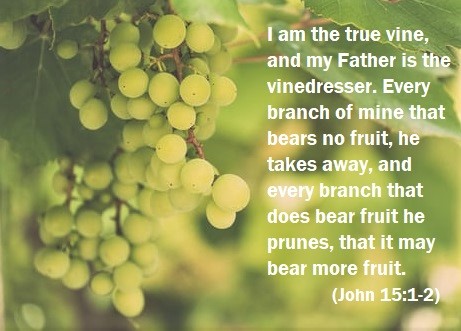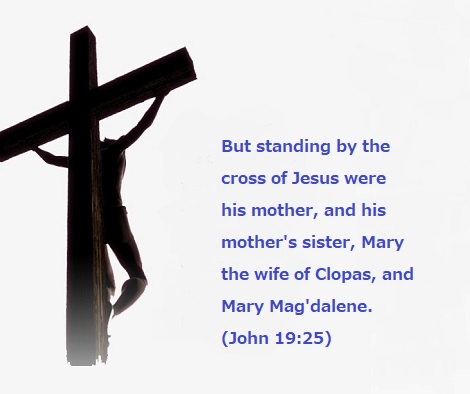The Estuary of Theology 25
The Branches of the Vine (1)
“I am the true vine, and my Father is the vinedresser. Every branch of mine that bears no fruit, he takes away, and every branch that does bear fruit he prunes, that it may bear more fruit” (John 15:1-2).
In
Jesus’ words, “I am the true vine, and my Father is the vinedresser,” we
can see the outpouring of the warm, loving trust of the Son, who, through the
knowledge of God, fully shares the will of the merciful Father who continues to
satisfy people’s needs. The word “branch of mine” refers to the condition
of a Christian in whose memory of senses (the five-sense data) the worldview of
Jesus appears through the training of the Book of Revelation and who
participates in the formation of the twofold spirituality of the Holy Spirit
and attends the Mass. The “branch of mine that bears no fruit” is the
contradiction that each Christian, a weak man, embraces when he/she takes the
information of the serpent (accidental information) as his/her own
knowledge without distinction despite his/her efforts to remain the branch of
Jesus.
So,
the expression “he takes away” means that the “enmity” (cf. Genesis 3:15)
that God has placed in his/her knowledge of good and
evil starts to work organically. As Jesus on the cross became the “enmity” that
God has placed itself and regained the free mind of the criminal who was crucified
with him and directed it to “God’s plan” (cf. The Estuary of Theology
issue14), the Christian, by the work of the “enmity” that God has placed, realises
that he/she was in a contradiction. Then he/she immediately recognises the
danger into which he/she has fallen, quickly turns to God and seeks to collaborate
with the Spirit of Jesus to solve the contradiction. The “branch that does
bear fruit” refers to the state of the Christian who has thus voluntarily
turned to “God’s plan.”
The
phrase “every branch that does bear fruit he prunes, that it may bear more
fruit” means that the Father makes the Christian, who has voluntarily
turned to “God’s plan,” experience the collaboration with the Spirit of Jesus
frequently in daily life starting with usual matters. As the Father rewards the
free mind of the Christian who entered into the darkness of no-information of
God in the formation of the twofold spirituality of the Holy Spirit, so also on
this occasion, seeing that the Christian’s knowledge of good and evil is connected
to “God’s plan” indicated by the Spirit of Jesus as if it bears a yoke, he
rewards his/her free mind in a way it is drawn to the Word of God “Be!” This
Christian, amid the activity with the Spirit of Jesus, experiences as if the
twofold darkness of no-information of God and self is continuing (cf. The
Estuary of Theology issue 23). However, his/her memory of the senses (five-sense
data) is not affected in any way by these conditions as it is when he/she is participating
in the formation of the twofold spirituality of the Holy Spirit, and it remembers
every single thing that happens even in this collaboration. So, throughout the
whole experience that he/she undergoes with the Spirit of Jesus, he/she experiences
the successive decisions made and activities taken there as if he/she were
watching them from a distance. It is as if he/she were the author of the Book
of Revelation, who testifies to what he has seen accompanied by the angel. In
this way, in collaboration with the Spirit of Jesus, the Christian learns
directly from the Holy Spirit, who is God, the way in which God achieves “God’s
plan,” and gains experience of touching God’s recognition that everything accomplished
was perfectly “good” (cf. Genesis 1:4-25) and “very good” (cf. Genesis 1:31).
“You
are already made clean by the word which I have spoken to you. Abide in me, and
I in you. As the branch cannot bear fruit by itself, unless it abides in the vine,
neither can you, unless you abide in me. I am the vine, you are the branches.
He who abides in me, and I in him, he it is that bears much fruit, for apart from me you can do nothing. If a man does not
abide in me, he is cast forth as a branch and withers; and the branches are
gathered, thrown into the fire and burned” (John 15:3-6).
The
phrase “You are already made clean by the word which I have spoken to you”
means that the Word of God makes those who listen to it clean. This state of being
“already made clean” becomes a reality when we attend the Mass and
listen to the Word of God and receive the Eucharist. It is because we receive
Jesus himself concretely with every sense of our five-sense and memorize the
fact that we have received him. This memory makes us realize Jesus’ word “Abide
in me, and I in you” and makes it our recognition (cf. The Estuary of
Theology issue 6). As Jesus says next, “apart from me you can do nothing,”
it is great wisdom to know that the Christian can do nothing without the memory
and the recognition of the concrete connection with Jesus, through attending the
Mass, listening to the Word of God, and receiving the Eucharist. The voice of
Jesus speaking sounds as if he keenly wants Christians to fully use the
preparations he himself is making with his life for the Holy Spirit and
Christians.
Jesus’s
words “If a man does not abide in me, he is cast forth as a branch and
withers; and the branches are gathered, thrown into the fire and burned”
are well understood by reading the last parable that he told in the Gospel of
Matthew just before his Passion (cf. Matthew 25:31-46). It is because it
clearly expresses the works of the Spirit of Jesus and the end of the
information of the serpent (accidental information). In this parable, we
see the King and those at his right hand and those at his left hand. And by the
King’s word, “O blessed of my Father,” we know that the King is Jesus
himself.
The
King, who is Jesus, commands those at his left hand: “Depart from me, you
cursed, into the eternal fire prepared for the devil and his angels”
(Matthew 25:41). From their refutation against these words of the King, “Lord,
when did we see thee hungry or thirsty or a stranger or naked or sick or in
prison, and did not minister to thee?” (Matthew 25:44), we know that they
knew Jesus the King. They were the information of the serpent (accidental
information), to which God said in Genesis, “[C]ursed are you above all
cattle, and above all wild animals” (Genesis 3:14). Therefore, they well know
Jesus, the Word, who said this. If a person dies being tightly connected with
this information of the serpent (accidental information), he will become
an evil spirit (cf. The Estuary of Theology issue 16). This is why the
evil spirit also knows Jesus well (cf. Mark 1:34, Luke 4:41).
The
King, on the other hand, commands those at his right hand: “Come, O blessed
of my Father, inherit the kingdom prepared for you from the foundation of the
world” (Matthew 25:34). From their question responding to these words of
the King, “Lord, when did we see thee hungry and feed thee, or thirsty and
give thee drink? And when did we see thee a stranger and welcome thee, or naked
and clothe thee? And when did we see thee sick or in prison and visit thee?”
(Matthew 25:37-39), we know that they did not know Jesus the King. The Gospel
here calls these people at his right hand “the righteous” (cf. Matthew 25:37).
The King says to these righteous people, “Truly, I say to you, as you did it
to one of the least of these my brethren, you did it to me” (Matthew 25:40).
The meaning of these words of the King can be understood from the following words
Jesus said at the end of the scene in the same Gospel of Matthew, where he gave
various instructions to the twelve Apostles on sending them out.
“He
who receives you receives me, and he who receives me receives him who sent me.
He who receives a prophet because he is a prophet shall receive a prophet's
reward, and he who receives a righteous man because he is a righteous man shall
receive a righteous man's reward. And whoever gives to
one of these little ones even a cup of cold water because he is a disciple,
truly, I say to you, he shall not lose his reward” (Matthew 10:40-42).
It
is not only Christians that the Spirit of Jesus invites to collaborate. The
Spirit of Jesus, who is sent to all the earth, invites all people to collaborate
with him. Many of these people are those who do not know Jesus. They do what is
right in the eyes of God, responding to the invitation of the Spirit of Jesus unknowingly
or almost reflexively. And even if their work is known and admired by others,
they often cannot explain well why they behaved like that. However, to those
who receive a prophet because he is a prophet, and a righteous man because he
is a righteous man, even if they do not know Jesus, he “who sent me,” namely
the Father, gives the same reward as a prophet and a righteous man. What then
will be the reward of the one who “gives to one of these little ones even a
cup of cold water because he is a disciple”? He will be baptized in the
name of the Father, the Son and the Holy Spirit by Jesus’ disciple who is
called “one of these little ones” by Jesus, and he will receive all that
he has prepared to become another disciple of Jesus.
In
this way, a person, after being baptized, becomes a Christian who has the
worldview of Jesus through the training of the Book of Revelation, participates
in the formation of the twofold spirituality of the Holy Spirit and the Mass,
and voluntarily seeks to make decisions and act with the Spirit of Jesus. It is
the precondition for a Christian to concretely collaborate with the Spirit of
Jesus that he/she receives all that Jesus prepared and fully uses them to abide
in him. By collaborating with the Christian who satisfies this precondition,
the Spirit of Jesus can make a Jesus Christ present in the world again.
A
Christian who collaborates with the Spirit of Jesus becomes a disciple of Jesus
who always abides in Jesus, keeping his words within him/her, and who asks for
whatever Jesus wills and sees it to be fulfilled and to bear much fruit. By
this, the following words of Jesus are fulfilled.
“If
you abide in me, and my words abide in you, ask whatever you will, and it shall
be done for you. By this my Father is glorified, that you bear much fruit, and
so prove to be my disciples” (John 15:7-8).
To
be continued.
Apr. 2021 in
Hiroshima
Maria K.


Comments
Post a Comment